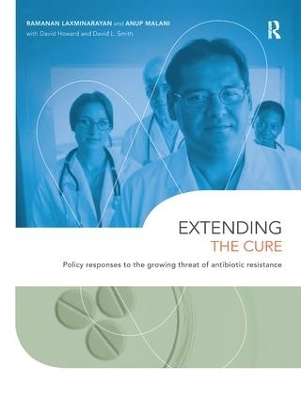
Extending the Cure
Routledge (Verlag)
978-1-138-16438-3 (ISBN)
- Titel z.Zt. nicht lieferbar
- Versandkostenfrei
- Auch auf Rechnung
- Artikel merken
Extending the Cure presents the problem of antibiotic resistance as a conflict between individual decision makers and their short-term interest and the interest of society as a whole, in both present and future: The effort that doctors make to please each patient by prescribing a drug when it might not be properly indicated, poor monitoring of discharged patients to ensure that they do not transmit drug-resistant pathogens to other persons, excesses in the marketing of new antibiotics, and the broad overuse of antibiotics all contribute to the development and spread of antibiotic-resistant bacteria. The book explores a range of policy options that would encourage patients, health care providers, and managed care organizations to serve as more responsible stewards of existing antibiotics as well as proposals that would give pharmaceutical firms greater incentives to develop new antibiotics and avoid overselling. If the problem continues unaddressed, antibiotic resistance has the potential to derail the health care system and return us to a world where people of all ages routinely die from simple infections. As a basis for future research and a spur to a critically important dialogue, Extending the Cure is a fundamental first step in addressing this public health crisis.
The Extending the Cure project is funded in part by the Robert Wood Johnson Foundation through its Pioneer Portfolio.
Ramanan Laxminarayan is a senior fellow at Resources for the Future in Washington, DC. His research includes the integration of epidemiological models of infectious disease transmission and the economic analysis of public health problems. He has worked with the World Health Organization on evaluating malaria treatment policy in Africa, and recently served on a National Academy of Science/Institute of Medicine Committee on the Economics of Anti-malarial Drugs. He teaches international health policy in the Johns Hopkins Bloomberg School of Public Health, and development economics at the Johns Hopkins University‘s Paul H. Nitze School of Advanced International Studies. Anup Malani is a Professor of Law at the University of Chicago. David Howard is an associate professor in the Department of Health Policy and Management at the Rollins School of Public Health, Emory University. David L. Smith is a mathematical epidemiologist at the Fogarty International Center of the National Institutes of Health.
Foreword
Executive Summary
Introduction
1. Antibiotic resistance: The unfolding crisis
2. The epidemiology of antibiotic resistance: Policy levers
3. Patient and physician demand for antibiotics
4. The role of health care facilities
5. The role of the federal government
6. The role of health insurance
7. Supply-side strategies for tackling resistance
8. Next steps
Acronyms and Abbreviations
Biographies
Consultation Participants
| Erscheinungsdatum | 09.03.2017 |
|---|---|
| Verlagsort | London |
| Sprache | englisch |
| Maße | 210 x 280 mm |
| Gewicht | 520 g |
| Themenwelt | Studium ► Querschnittsbereiche ► Infektiologie / Immunologie |
| Studium ► Querschnittsbereiche ► Prävention / Gesundheitsförderung | |
| Naturwissenschaften ► Biologie ► Ökologie / Naturschutz | |
| Naturwissenschaften ► Geowissenschaften ► Geografie / Kartografie | |
| Technik ► Umwelttechnik / Biotechnologie | |
| ISBN-10 | 1-138-16438-0 / 1138164380 |
| ISBN-13 | 978-1-138-16438-3 / 9781138164383 |
| Zustand | Neuware |
| Haben Sie eine Frage zum Produkt? |
aus dem Bereich


